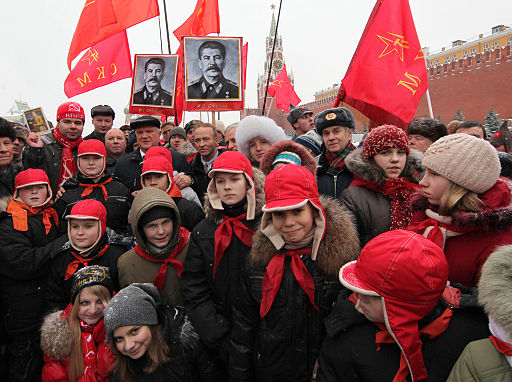
Photo: Victorgrigas via Wikimedia Commons
With his regime running out of steam, Vladimir Putin is resorting to the rhetoric of the past and traditional values. Marie Mendras sees little future in it.
The moment of truth for a non-democratic leader is when he needs to revive his fading authority and legitimacy. A snatched electoral victory over a year ago brought Vladimir Putin no new popularity, indeed quite the opposite.
Since his return to the Kremlin, his words and actions have reflected entirely negative emotions, such as fear of his own people, distrust of the elites around him, and a desire to avenge himself on those who have dared oppose him. Much of his energy goes on proving himself right and his critics wrong: he even accuses these of working for foreign powers and endangering national security. Putin has not recovered from the humiliation and scare of last year’s political contest, and is now facing tough economic and social challenges. The choice he has made is to try to restore his authority with a combination of targeted repression, doctrinaire ideology and an increase in control over institutions and companies. This is an unlikely recipe for success.
Weakened legitimacy
Vladimir Putin was re-elected on a controversial vote in March 2012. He could have won his new mandate more honestly, had he accepted the possibility of a second round runoff, but he was determined to win an absolute majority in the first round. He wanted to humiliate the other ‘authorised’ candidates by raising himself high above them, proving that he was the one and only – and a loyal Central Electoral Commission conferred on him a generous 63% of the vote. A year on, all the voters’ associations and NGOs that investigated election fraud are being harassed and some, like the Golos association, might have to close down. Key figures in the movement for free elections are also being prosecuted.
Putin’s election in 2000 and 2004, and Dmitry Medvedev’s election in 2008, were ‘managed’ ballots as well. This time, however, things turned out less manageable than usual. The widespread and vocal public protest of the winter of 2011-12, news of which flew around the country in a few keystrokes, exposed all of the regime’s rottenness and trickery. And the anger of a revitalized civil society was directed at the leader in person, under the ubiquitous slogan: ‘Putin, ukhodi!’ [Putin – out!]. His party fared badly in the parliamentary elections of December 2011, and in Moscow itself its performance was a complete disaster.
Throughout the 2000s, Vladimir Putin built his power and legitimacy on order, rising living standards and Russia’s growing global status. However, he will have more difficulty delivering in all three of these areas in the months and years to come, and he will be held to account for it. (more…)
Filed under Uncategorized
Tags: Alexei Navalny, Boris Yeltsin, Brezhnev, elections, Medvedev, nationalism, protests, Putin, Russia, Sergei Udaltsov, Vladimir Putin, Vladimir Ryzhkov, Yevgeniya Chirikova
No Comments »
 Close
Close







